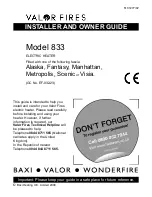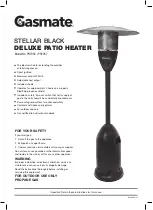
i) for under-sink models (EP 10 UR - EP 15 UR) disconnect pipes and
removed the heater from the wall.
ii) for over-sink models (EP 10 OR - EP 15 OR - EP 30 R 3KW) undo the
cold water supply pipe and open a hot water tap.
The heating element may be removed (after taking out the thermostat
phials on model EP 30 R 3KW) by undoing the M6 nut.
The assembly should then be turned through 90° anti-clockwise to ease
removal from the water container.
Once the element is free from the water container the anode may then
be inspected and removed if necessary.
When reassembling the cover make sure that the regulation knob is
coupled with the thermostat.
Check controls (where fitted) as per the following:
- Line strainer - with the water supply turned off remove screen from
strainer and clean of any detritus;
- Expansion vessel - with the water supply turned off and taps open, check
expansion vessel pressure and top up as necessary;
- Temperature & pressure relief valve - with the water supply turned on,
check manually by lifting the test lever/turning the test knob (ensure valve
closes after testing);
- Expansion relief valve - check manually by turning the test knob (ensure
valve closes after testing);
- Discharge pipes (D1) - from both temperature & pressure relief and
expansion relief valve for obstructions;
- Tundish & discharge pipe (D2)- open either valve gradually to produce a
full bore discharge into tundish and D2 without any back pressure;
- Pressure reducing valve - check that the correct outlet pressure is being
maintained by recording the pressure at an in-line terminal fitting i.e. tap.
Fault finding
1)Pressure and temperature valve dripping/running all the time.
Cause:
Thermal cut-out and thermostat have failed (this is only the
case if the water being discharged is near to boiling).
Mains pressure is above 7 bar. A pressure reducing valve must
be fitted (see page 4, Fig..1).
2)Pressure relief valve dripping/running all the time.
Cause:
Mains pressure is above 6 bar. A pressure reducing valve must
be fitted (see page 5, Fig. 2).
11


































